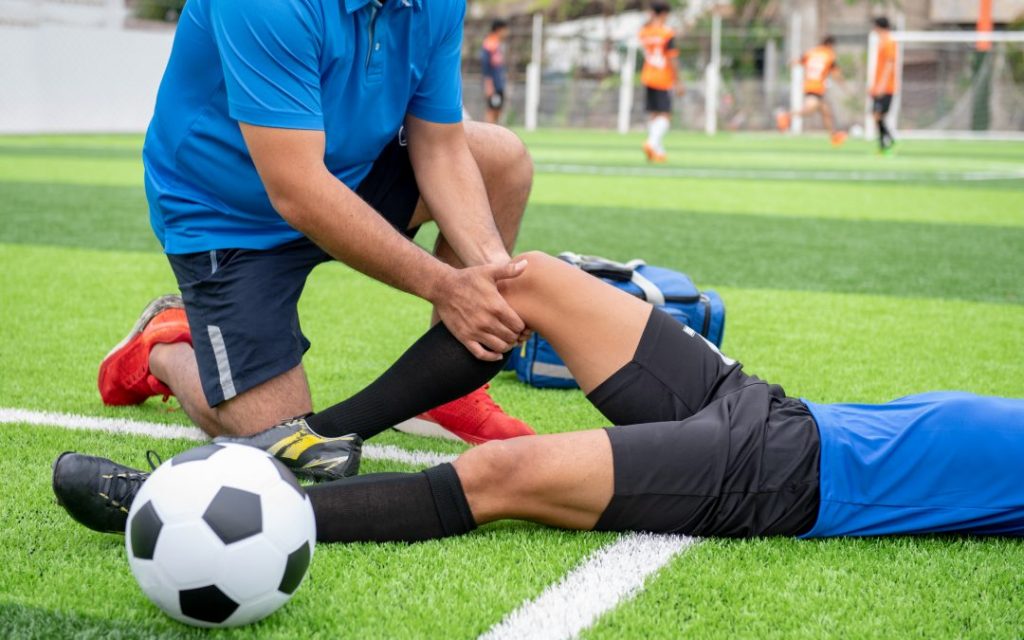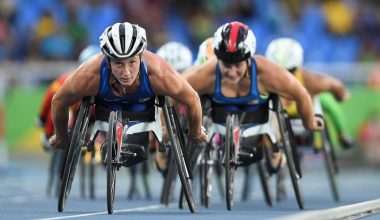Securing sports injuries can be dauntingly painful and disturbing as well. It brings about a lot of emotional and psychological disturbances that may hinder the victim from recovering in good time.
Often times sports athletes who have fallen in injuries get a lot of fears concerning how and when they are going to heal from their injuries and this makes them behave and react in a certain manner of emotions which may obviously depict pain, denial, anger, sadness, and even depression.
Often times a person who has an injury hardly finds fun or joy in most things they used to enjoy. They begin to see life as being unfair to them. This usually happens when they see people that are physically active and healthy.
Yes, all of these feelings may really be there, but it’s also very important that the person leaves that mindset and consciously condition their mind for the recovery process. It is imperative that he learns to really move on, shred negative thoughts that may further keep him on the bed and then find more positive strategies to either tackle or cope with his current condition.
I have come to find out that worrying about your condition will do you no good but will further compound your problem and you can be sure not to be getting out of bed any time soon when you worry.
Be it as it may, and in many cases, dealing gracefully with an injury helps an athlete become more focused, flexible, and resilient and ultimately puts him on a very fast lane to recovery.
Here in this article, I have written you tips on how to recover from sports injuries speedily. But firstly, let me show you:

Table of Contents
Health Implications of Sports Injuries
One may not fully exhaust the numerous burdening health effects of sports injuries. Injuries can really counter the beneficial effects of sports participation if a person; old or young, is unable to continue to participate because of the residual effects of an injury.
Long term Musculoskeletal problems:
According to NCBI, radiological findings implicate the effects of intense physical loading and injury in the development of spinal pathology and back pain during the growth of young athletes.
Quite a number of people have secured long-term disabilities sports injuries which they may go on to suffer in old age from.
Depending on the kind of sports you do, you might become a victim of sports injuries due to overuse, insufficient warm-up, overexertion of muscles or unfortunate accidents such as falls or crashing into another player and also if you don’t give yourself time to recover from previous sports outings.
Already a research has shown that there is a higher risk of repeated muscle and joint injuries if you do not achieve full recovery from the initial injury. You stand the risk of developing musculoskeletal problems. This might form a pattern that might become long-lasting.
Psychological effects:
Studies that investigate the temporary psychological mentality of injured and uninjured sports performers have consistently found injured athletes as having a higher psychological effect than uninjured athletes as well as lower self-esteem, higher levels of depression and more incidences of negative thoughts.
Research has uncovered that an athlete’s thought of probably suffering an injury or another injury may be very disturbing and may bring fear and confusion.
Furthermore, research has proposed an idea that an injured athlete will feel as though they have lost a major part of their ‘self’, potentially leading to the onset of negative thoughts and beliefs all other psychological problems.
Financial burdens:
The cost of managing sports injuries is usually expensive depending on the degree of injury. It costs quite a fortune to get off the injury bench and back to your feet. And this as well leads to heightened emotional disturbances. If you may be out of work for several months or longer, check here for options for disability assistance.
Cost of Managing Injuries in Sports
Every health-related problem has physical, psychological and economic consequences. To sponsor injury recovery processes is expensive.
A researcher, Jiri Dvorak stated in his study which he carried out in 2000 that cost of medical treatment of an injury in football was about 150 dollars. When the socio-economic dimension of football injuries in Switzerland was reviewed, it was found that there were 220 thousand active players and approximately 400 thousand people who do it as a hobby.
It was stated that 40 thousand injuries occur in a year regarding this number of people, which results in 500 thousand working day loss. According to the data of national insurance companies of 2003, the financial dimension of this is 20 million Swiss francs which are approximately 87 million US dollars.
Also, a research conducted by the Florida Agency for Health Care Administration between the year 2010 to 2014 has revealed that over the 5 years, sports injuries in Florida youths cost $24 million for inpatient care and $87 million for ED care.
On average it costs about $6000 to sponsor a severe injury recovery.
Tips to Quick Sports injury Recovery- See how
If you have been injured and you really desire to recover from the injuries, I’m going to share with you right away trusted tips on quick injury recovery that will really help you recover from your injuries. See how below;
#1. The “RICE” Remedy
The acronym “RICE” is simply an acronym used to represent the words; Rest, Ice, Compression and, Elevation.
The “RICE” acronym is a popular acronym usually used in sports injury healing and management. It is a combination therapy for the management of certain kinds of tissue injuries, for example, sprain, muscle pull.
Rest:
The “Rest” in this means you should stop every form of activity and find a place to rest and relax your muscles and nerves if you notice you are beginning to catch pains around a particular area of your body. This is very important to prevent worsening of the problem.
Ice:
Cold therapy (icing) helps alleviate pain while compression with soft bandage limits swelling. Apply ice to the injured part for a period of time, say 30 to 45 minutes. Do this about 6 hourly or even more. this is going to help reduce the bleeding, the swelling, pain all around the area.
Compression:
Be sure to apply compression to the injured area in the initial 48 hours after injury to prevent excessive swelling. Compress the injured area with an elastic bandage to minimize swelling by preventing the build-up of fluid. The bandage should be firm, but not too tight such that it causes discomfort or interferes with blood flow. While this may be painful, it can also help your condition. Take and endure the pain and you will see the results.
Elevation:
Elevating the injured part especially if it is a limb will help to reduce swelling. In the case of lower limb injuries, keep the ankle above the hip. For upper limb injuries, use a pillow or sling to elevate the area.
#2. See a Doctor
You should contact your doctor if the injury seems minor but doesn’t improve with simple home treatment. Any condition that affects training or performance but has not been diagnosed or treated should also be the green light to consult your doctor.
It won’t be so nice to trivialize some certain issues concerning your health. When you notice the “RICE” does not help improve your condition, I think it would be nice you go see a doctor.
The “RICE” method won’t treat the underlying issues for more serious conditions. Only a doctor can help you identify the difference between being hurt and suffering from an injury.
#3. Have an Open mind: Be Responsible for Yourself
While you are with your doctor, you will have to develop a positive and open mind to take his counsels. I know one of the things he will tell you is to be responsible for what happened to you and then allow yourself time to heal. This is one of the tips you have to heed to if you must recover from the injuries.
See the truth is that you have an injury from your sports activities which you want to recover from but see this: Instead of focusing on performance, you need to accept that now you have an injury and you are the only one that can fully determine your outcome. Every other factor is secondary, you are the first to determine if you want to get out of bed soon or not.
To heal quickly you need to be committed to overcoming your injury by showing up for your treatments, and listening and doing what your doctor and/or athletic trainer recommend.
Furthermore, you will need to see yourself getting healed soon in your mind. Create a mental picture of it and stay true to it. This is called Imagery techniques. It uses all of the senses to create mental images, feelings, and sensations related to the desired outcome as though it is happening now or has already happened.
Also then, learn to give yourself the required time to get in form.
Learn and understand what happened to you and why it happened. This is going to help prevent you from getting future sports injuries.
#3. Good nutrition and Dieting
Doing the right nutrition with the numerous foods and supplements available can help the body heal and recover faster from an injury.
Protein-rich foods also known as bodybuilding foods helps to rebuild worn-out or broken tissues of the body. Example of such foods as meat and fish enhance the body’s muscle-building process.
Citrus fruits and dark leafy greens rich in vitamin C helps produce collagen that rebuilds tissues and has anti-inflammatory properties.
Omega-3 fats from supplements limit excessive inflammation and help speed up recovery. With bone injuries such as fractures, taking more calcium-rich foods and vitamin D from sunlight exposure is essential.
A word from Kikky
We sure do understand your pain and we no one likes to sit at home or on the sidelines recovering from a sports injury but with the right knowledge, support and, patience a quick injury recovery can be realized without turning your whole world upside down. By maintaining a positive while allowing self-time to heal, most athletes can overcome minor injuries quickly and major injuries in time. We know these simple tips here can help.





